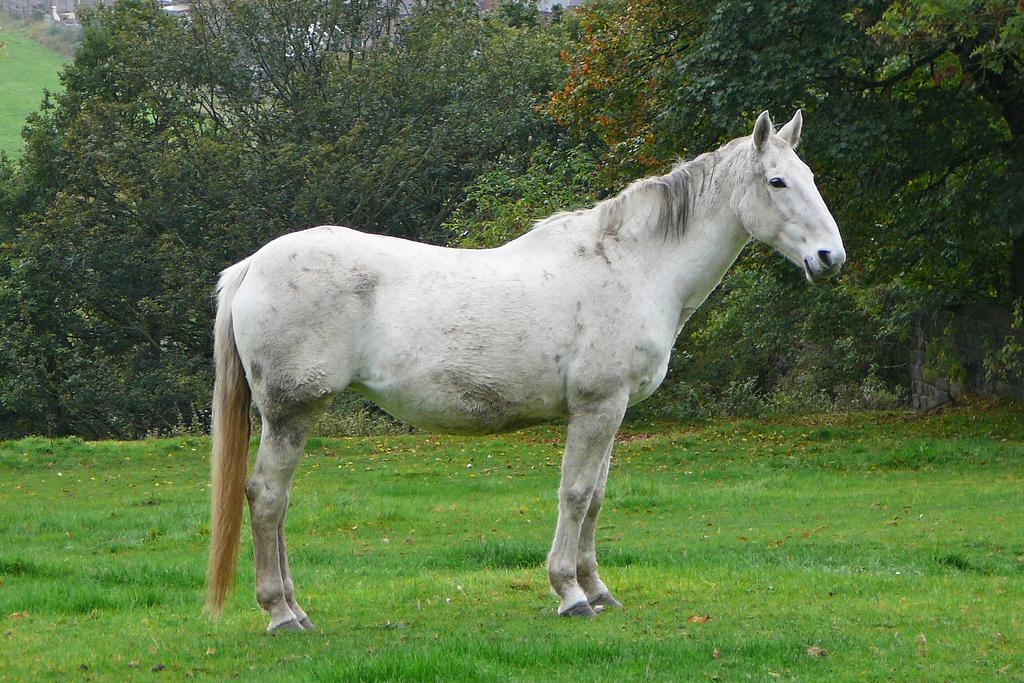
Your Turn: Horses Are a Lifelong Commitment
Student Lilly Harmon discusses the increasing epidemic in the United States of uneducated owners unwittingly selling their geriatric horses into the slaughter pipeline — and the implications this can have for human health as well as equine well-being.
I am writing to discuss a rapidly increasing epidemic that is apparent throughout the horse community of the United States. This epidemic is negatively affecting both the well-being of thousands of elderly horses in North America and consequently, the health of millions of horsemeat consumers worldwide.
Geriatric horses, with weakened immune systems and bodies due to the side effects of aging, are being sold at rock-bottom prices to the quickest buyers (who are often either uneducated horse owners or kill buyers). These elderly horses are contracting and spreading diseases that result in needing extra medical care that uneducated horse owners cannot provide. Kill buyers are also combating these diseases and are secretly administering pain killers like phenylbutazone, or bute, to ease the pain of these elderly horses, which creates contaminated horsemeat unfit for human consumption. This is a brutal cycle has been happening for far too long and a solution needs to be sought immediately.
As winter draws closer, horse owners are rapidly selling high-maintenance horses that require extra calories, more attention, and heavy blanketing. As horse owners are trying to down size their herds, the amount of sale postings for elderly horses increases. Any horse person who is a member of any “Horses for Sale” Facebook pages and groups has seen ads like this:
FOR SALE: 28 year old chestnut gelding, only $100, to good home only! Don’t let his age fool you, he still has lots of life left. Arthritis in both front feet, but he still loves to go! Great first horse for a beginner kid!
Across the US, uneducated owners are purchasing cheap and high maintenance horses. They are also unknowingly causing their horses stress and frustration, resulting in the animals having weakened immune systems that will contract and spread diseases. Being sold and therefore relocated is the biggest trust violation and stressor that could happen to a horse, especially a geriatric one. Horses are very trusting animals and when their trust is violated, it can have mental and cognitive, as well as physical effects. Dr. Robin Foster, Ph.D, a horse professional, said that “trust is fragile, and repeated trust violations can damage both present and future relationships.” When a horse is uprooted from their life-long home and sold because their previous owner did not foresee the consequences of an aging horse, the horse is ultimately betrayed.
On the industrial side of the horse community, kill buyers (or horse buyers who sell livestock to slaughterhouses mostly in Canada and Mexico) are preying upon US horse owners who are selling their loyal elderly horses for too low of prices. Kill buyers can make a reasonable profit with a $200 geriatric horse: $.80 per lb x 1100lb horse = $880 – $200 = $680 (National Canadian Market Prices from March 3, 2017).
However, kill buyers leave these elderly horses in holding areas (or kill pens) for weeks (sometimes months) with other livestock as they wait to be slaughtered. These holding pens are filled with diseased and unhealthy geriatric horses, which often leads to premature and unnecessary deaths. Elderly horses found in ill conditions are often given pain medications, like human NSAIDS. The US Food and Drug Administration has stated that these medicines are to be strictly used with animals that are not to be consumed by humans; however, kill buyers are not adhering to these government rules. Common pain killers, like bute, contaminate horsemeat and can cause serious blood diseases, like aplastic anemia, when consumed. Every day, kill buyers are drugging their geriatric horses and are potentially causing life threatening illnesses in humans across the world, without any consequences.
It is the responsibility of horse professionals such as responsible owners, farriers, veterinarians, and trainers to properly educate all horse owners about the life-long commitment of owning a horse. If owners would quit selling their geriatric horses and keep them in their life-long homes, these horses would be healthier and contaminated toxic horsemeat would no longer be a concern. With more education among professionals, all horse owners would understand the consequences of relocating their elderly horses and increased possibility of it going to kill buyers.
It is also possible to fix the slaughterhouse section of this issue by calling for new legislation from the Canadian Food Inspection Agency to regulate the health of horses that are waiting for slaughter. For example, they should require detailed medical history paperwork for each horse. Both of these solutions would require funding from the Canadian government and the horse community, but the costs are worth the benefit of fixing an increasingly hazardous cycle that the North American horse community has found itself caught up in.
I ask that you consider these ideas and think about the immorality that is happening right now in our local horse communities and how it is affecting the global health across the planet. The simple solutions of providing education materials to horse owners and the implementation of new government regulations would stop this horrible cycle of horse and human deaths.
Lilly Harmon is a college student in Northern Michigan and is an avid equestrian enthusiast. She enjoys ending a stressful day of classes with a good trail ride on a happy horse. Her current goal is to compete in endurance or long distance rides by 2019.
Is it “Your Turn”? We love publishing reader essays — send yours to [email protected]!






Leave a Comment